9 Nov 2017 | Asia and Pacific, Awards, China, Europe and Central Asia, Fellowship, Fellowship 2017, Maldives, News and features, Russia, Turkey
[vc_row][vc_column][vc_column_text]

From left: Cartoonist Martin Rowson accepting the Arts Award on behalf of Chinese cartoonist Rebel Pepper; Alp Toker of Digital Activism Award-winner Turkey Blocks; Isik Mater of Digital Activism Award-winner Turkey Blocks; Anastasia Zotova, wife and campaign partner of Campaigning Award-winner Ildar Dadin; Ahmed Naish, deputy editor of Journalism Award-winning Maldives Independent; Zaheena Rasheed, former editor of Journalism Award-winning Maldives Independent. (Photo: Elina Kansikas for Index on Censorship)
Since the Index on Censorship Awards, the 2017 fellows have been busy doing important work in their respective fields to further their cause and for stronger freedom of expression around the world.
Rebel Pepper / Arts

Baby Pepper
Rebel Pepper, the Chinese cartoonist critical of the country’s government, now lives in exile in the USA where he works for Radio Free Asia. “Everything is going well, and I have a lot of friendly colleagues who like my work,” he told Index on Censorship.
He also continues to write his column in the Japanese version of Newsweek and worries about many recent developments in his home country. “The CCP’s control of society is becoming more and more severe, people are exposed to less and less real news from the outside world, and vice versa,” he says. “It’s hard to sum up because there are so many problems right now.”
The artist is still getting cartoons published and says the Index on Censorship award gave him the energy to “keep walking on the creative road”.
There is a new addition to the Rebel Pepper family, with baby Kitano. “Every day I have to change a lot of diapers, which has had a big influence on my sleeping patterns, so I have to find some fun from him,” Rebel Pepper tells Index, brandishing a cartoon to illustrate his point.
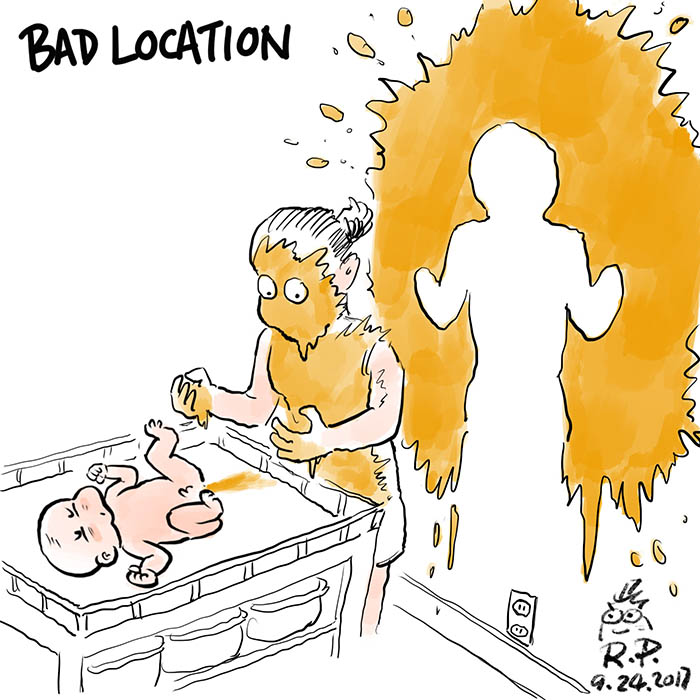
Idler Dadin / Campaigning
Campaigning fellow Ildar Dadin has returned to activism since his release from prison in February. “Along with friends or on single pickets, we are openly showing that we aren’t in agreement with what’s happening in the country,” Dadin tells Index.
Last month he was detained in St Petersburg while trying to film a woman being assaulted by police. “The situation in this country now is really bad,” Dadin says. “There’s a new kind of police force which can attack and humiliate people, which is very serious.”
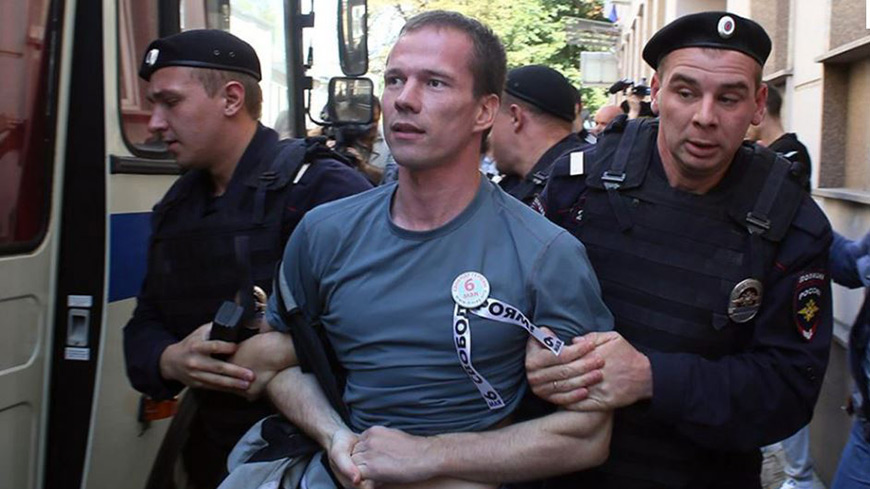
He describes the arrests of more than 260 people during anti-Putin protests across Russia — including St Petersburg — in October as “pretty much normal for any activist in the country”.
Dadin believes that pressure from civil society both in Russia and abroad were partially responsible for his release. He hopes for “justice for all people, not just Russians”.
Moving forward, Index is helping Dadin with his transition to life outside of prison and prioritising his health and also helping him to gain additional international exposure.
Turkey Blocks / Digital Activism
“We are now going to be the NetBlocks project and expand our work,” director of research at Turkey Blocks Isik Mater tells Index. The team are taking steps to formalise some of their tools and methodologies, expand into new regions that have similar needs and now cover several countries experimentally.
The Turkey Blocks team have also developed a new tool called Cost, which calculates the financial impact of mass-censorship. “Governments don’t tend to care about the human rights argument, so they don’t listen to it,” says Alp Toker, founder of Turkey Blocks. “But if you tell them ‘this will cost x million dollars of harm to GDP’ then they perk up because that can become a political issue, which is a very powerful method of convincing governments not to censor content.”
Turkey, however, has been quite quiet recently in terms of internet shutdowns, after a barrage of such incidents in the year following the attempted coup in July 2016. In fact, the Turkish government have been using Turkey Blocks data on internet shutdowns as a kind of audit, Toker explains. “We ran our first panel with the Turkish government just a few weeks ago, which is kind of historic,” he says. “We are seeing really positive things, and although they have a long way to go it should be noted that they’ve been willing to have a dialogue with civil society and with a human rights group.”
Index on Censorship is helping Turkey Blocks through the process of forming a board and incorporating public speaking training skills for Mater so that she too can begin to make more public appearances.
Maldives Independent / Journalism
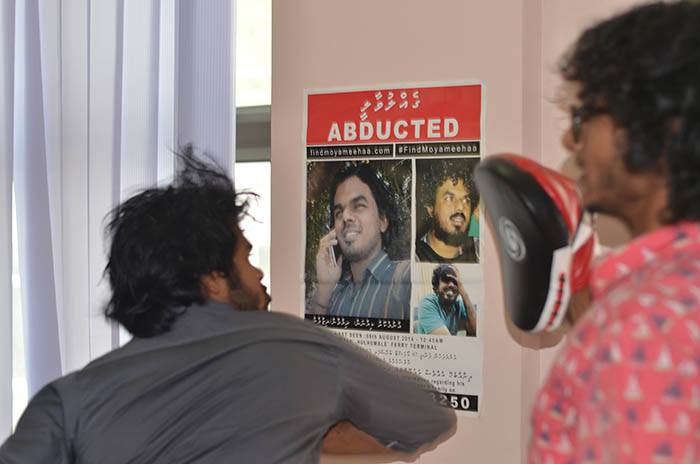
Staff at the Maldives Independent taking part in self-defence training.
Journalism fellows at Maldives Independent are going through a period of change. Former editor Zaheena Rasheed left the publication soon after awards week in London to take up a position on the online team at Al Jazeera, where she has recently been doing a lot of work covering the Rohingya refugee crisis from Bangladesh.
For personal reasons, Rasheed finds it difficult to be involved with the Maldives on top of this. “A friend of ours in the Maldives, Yameen Rasheed, was murdered at the end of the Index awards week in London and that was a big blow — it was very hard for me.”
Yameen Rasheed was a prominent blogger and internet activist who died from multiple stab wounds after an attack in the stairway of his apartment building in Malé on Sunday 23 April 2017. Index on Censorship has been involved in helping the Maldives Independent better secure their personal and office safety since Yameen Rasheed’s murder, including a recent self-defence training session.
A new editor took over at the Maldives Independent in mid-September and since then the publication has seen a noticeable spike in readership, and reporters are encouraged to get out and meet people, build relationships and contacts.
“It’s fairly calm at the moment — there have been no coups, for example — so I see this period as a time to hone the team’s reporting and feature writing skills,” a staff member tells Index. “We’re doing a broad mix of news and features: politics, tourism, mental health, rave culture, the hipster coffee scene, rural development, sex abuse cover-ups.”
Staff at the Maldives Independent hope that the publication continues to be a forum for debate and free speech, that it holds power to account, exposes wrongdoing and corruption and most of all give insight into a country that many people have only one image of.
[/vc_column_text][/vc_column][/vc_row][vc_row][vc_column][vc_basic_grid post_type=”post” max_items=”4″ element_width=”6″ grid_id=”vc_gid:1510228913303-fd0d57c2-b760-1″][/vc_column][/vc_row]
6 Nov 2017 | Digital Freedom, News and features
[vc_row][vc_column][vc_column_text]
Facebook has received much criticism recently around the removal of content and its lack of transparency as to the reasons why. Although it maintains their right as a private company to remove content that violates community guidelines, many critics claim this disproportionately targets marginalised people and groups. A report by ProPublica in June 2017 found that Facebook’s secret censorship policies “tend to favour elites and governments over grassroots activists and racial minorities”.
The company claims in their community standards that they don’t censor posts that are newsworthy or raise awareness, but this clearly isn’t always the case.
The Rohingya people
Most recently, almost a year after the human rights groups’ letter, Facebook has continuously censored content related to the Rohingya people, a stateless minority who mostly reside in Burma. Rohingya have repeatedly been banned from Facebook for posting about atrocities committed against them. The story resurfaced amid claims that Rohingya people will be offered sterilisation in refugee camps.
Refugees have used Facebook as a tool to document the accounts of ethnic cleansing against their communities in refugee camps and Burma’s conflict zone, the Rakhine State. These areas range from difficult to impossible to be reached by reporters, making first-hand accounts so important.
Rohingya activists told the Daily Beast that their accounts are frequently taken down or suspended when they post about their persecution by the Burmese military.
Dakota Access Pipeline protesters
In September 2016 Facebook admitted removing a live video posted by anti-Dakota Access Pipeline activists in the USA. The video showed police arresting around two dozen protesters, although after the link was shared access was denied to viewers.
Facebook blamed their automated spam filter for censoring the video, a feature that is often criticised for being vague and secretive.
Palestinian journalists
In the same month as the Dakota Access Pipeline video, Facebook suspended the accounts of editors from two Palestinian news publications based in the occupied West Bank without providing a reason. There are no reports of the journalists violating the networking site’s community standards, but the editors allege their pages may have been censored because of a recent agreement between the US social media giant and the Israeli government aimed at tackling posts inciting violence.
Facebook later released a statement which stated: “Our team processes millions of reports each week, and we sometimes get things wrong.”
US police brutality
In July 2016 a Facebook live video was censored for showing the aftermath of a black man shot by US police in his car. Philando Castile was asked to provide his license and registration but was shot when attempting to do so, according to Lavish Reynolds, Castile’s girlfriend who posted the video.
The video does not appear to violate Facebook’s community standards. According to these rules, videos depicting violence should only be removed if they are “shared for sadistic pleasure or to celebrate or glorify violence”.
“Facebook has long been a place where people share their experiences and raise awareness about important issues,” the policy states. “Sometimes, those experiences and issues involve violence and graphic images of public interest or concern, such as human rights abuses or acts of terrorism.”
Reynold’s video was to condemn wrongful violence and therefore was appropriate to be shown on the website.
Facebook blamed the removal of the video on a glitch.
Swedish breast cancer awareness video
In October 2016, Facebook removed a Swedish breast cancer awareness campaign that had depictions of cartoon breasts. The breasts were abstract circles in different shades of pinks. The purpose of the video was to raise awareness and to educate, meaning that by Facebook’s standards, it should not have been censored.
The video was reposted and Facebook apologised, claiming once again that the removal was a mistake.
The Autumn issue of Index on Censorship magazine explored the censorship of the female nipple, which occurs offline and on in many areas around the world. In October 2017 a Facebook post by Index’s Hannah Machlin on the censoring of female nipples was removed for violating community standards.
“Napalm girl” Vietnam War photo
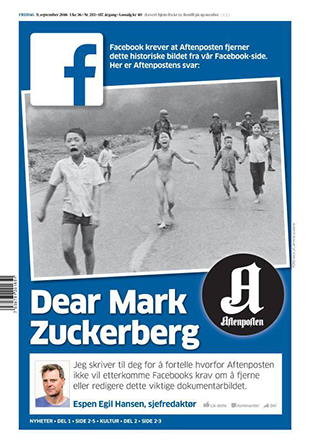 A month earlier, in a serious blow to media freedom, Facebook removed an iconic photo from the Vietnam War. The photo is widespread and famous for revealing the atrocities of the war, especially on innocent people like children.
A month earlier, in a serious blow to media freedom, Facebook removed an iconic photo from the Vietnam War. The photo is widespread and famous for revealing the atrocities of the war, especially on innocent people like children.
In a statement made following the removal of the photograph, Index on Censorship said: “Facebook should be a platform for … open debate, including the viewing of images and stories that some people may find offensive, is vital for democracy. Platforms such as Facebook can play an essential role in ensuring this.”
The newspaper whose post was censored posted a front-page open letter to Mark Zuckerberg stating that the CEO was abusing his power. After public outrage and the open letter, Facebook released a statement claiming they are “always looking to improve our policies to make sure they both promote free expression and keep our community safe”.
Facebook’s community standards claim they remove photos of sexual assault against minors but don’t mention historical photos or those which do not contain sexual assault.
The young woman shown in the photo, who now lives in Canada, released her own statement saying: “I’m saddened by those who would focus on the nudity in the historic picture rather than the powerful message it conveys. I fully support the documentary image taken by Nick Ut as a moment of truth that capture the horror of war and its effects on innocent victims.”[/vc_column_text][/vc_column][/vc_row][vc_row][vc_column][vc_basic_grid post_type=”post” max_items=”4″ element_width=”6″ grid_id=”vc_gid:1509981254255-452e74e2-3762-2″ taxonomies=”1721″][/vc_column][/vc_row]
31 Oct 2017 | Azerbaijan, Belarus, Czech Republic, Germany, Hungary, Italy, Malta, Media Freedom, Montenegro, News and features, Russia, Serbia
[vc_row][vc_column][vc_column_text]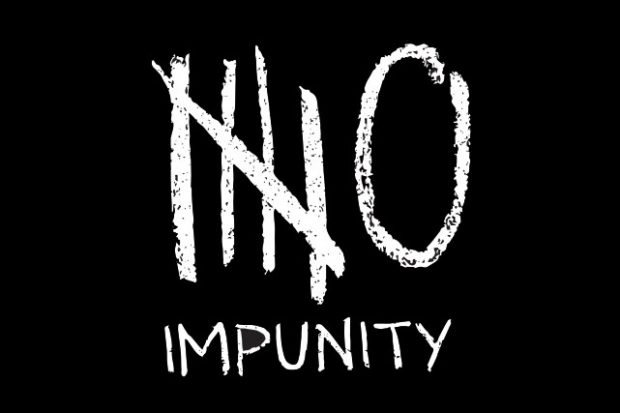
Since 2004, over 700 journalists have been killed for their reporting. Nine out of 10 of these cases go unpunished.
Index on Censorship’s Mapping Media Freedom platform verified a number of reports of impunity since it began monitoring threats to press freedom across Europe in May 2014. Reporters Without Borders also tracks cases of violence against journalists in its annual press freedom barometer and its end-of-year round-up of journalists killed worldwide.
“The brutal murder of Daphne Caruana Galizia on 16 October is a stark reminder of the dangers journalists face for reporting in the public interest. Pressure must be brought to bear on government officials in all countries to ensure that crimes against journalists do not go unpunished,” Hannah Machlin, project manager for Mapping Media Freedom, said.
Impunity, which is defined as the exemption from punishment or paying reparation for a crime, goes hand-in-hand with authorities’ inaction when investigating both violent and nonviolent actions against journalists.
“Violence against journalists and impunity for their attackers has become all too common in many parts of the world, and alarmingly, is on the rise in Europe, particularly in cases of journalists investigating corruption. We reiterate our call for the creation of a UN Special Representative for the Safety of Journalists to address this vicious cycle”, said Rebecca Vincent, UK Bureau Director for Reporters Without Borders.
To condemn such crimes, increase accountability and defend the rights of media professionals, the United Nations General Assembly proclaimed 2 November as the ‘International Day to End Impunity for Crimes Against Journalists’ in 2013. It has since been observed to raise awareness of impunity and condemn violence against the media.
AZERBAIJAN
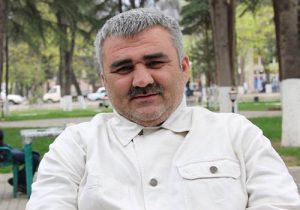
Azerbaijani journalist Afgan Mukhtarli
On 29 May 2017, investigative journalist and government critic Afgan Mukhtarli disappeared on his way home in Tbilisi, Georgia. Mukhtarli reappeared the next day across the border in Azerbaijan and was accused of illegal border crossing, resisting police and smuggling when police allegedly found €12,000 on his person. He was immediately sentenced to three months in pre-trial detention.
This case is unique in that it is the first cross-border operation alleged to be accompanied by the Georgian government. Azerbaijani lawmaker and a member of the Parliament Human Rights Committee Elman Nasirov claimed Mukhtarli’s kidnapping was “the most successful operation carried out in recent years”. Nasirov also accused him of being a member of a broader anti-Azerbaijan network. As a preventive mechanism, Nasirov claimed that Azerbaijani special forces made necessary arrangements with Georgian special forces.
Police have questioned political activists, members of opposition parties, and journalists as part of the investigation. Sevinc Vagifqizi, a freelance reporter, was detained while waiting outside the state border services where Mukhtarli was being held. Other journalists who have been questioned in the case of Mukhtarli are investigative journalist Khadija Ismayilova, who is facing a travel ban despite her release from jail, and more recently, Aytac Ahmadova.
The circumstances of Mukhtarli’s arrest were also notable for the suspicious injuries he sustained. Outside of his abduction, Mukhtarli’s lawyer reported that he had suffered a broken nose, multiple bruises and a possible broken rib.
BELARUS
On 12 March 2017, Adarya Hushtyn, the editor for BelaPAN news agency, arrived from Minsk to the town of Orsha in the Vitsebsk region of Belarus to cover a protest against the tax on the unemployed which was to be held in the early afternoon.
When she arrived that morning, she was stopped at the railway station by the commander of the riot police squad to check her documents and press card. She was then detained by police officers together with Nasha Niva newspaper correspondent Siarhei Hoodzilin who had arrived to cover the same protest.
At the police station, both journalists were searched and informed that they were being checked for in the database of wanted people. Hushtyn was detained at the police station for nearly three hours without any explanation. She was only released after the protest she intended to report on was over.
Hushtyn filed a complaint against her illegal detention and was told that she was mistaken for another woman who was also wanted by the police. As it turned out, this woman was not only unlike the journalist but was found two weeks prior to Hushtyn’s detention. She also filed an application to the prosecutor’s office to initiate a criminal case under Article 198 of the Criminal Code of the Republic of Belarus “preventing from lawful professional activity of a journalist”, but was refused.
In March 2017, the Belarusian Association of Journalists (BAJ) made an appeal to the Minister of Home Affairs calling on the authorities to investigative the mass violations of journalists’ rights. The reply was that police officers did not violate any law and that BAJ “has to stop ‘covering up’ and ‘justifying’ the people who have nothing to do with mass media”.
In March alone, 94 reporters were detained and 6 were beaten by the police while covering nationwide protests.
CZECH REPUBLIC
In April 1992, Václav Dvořák was shot and killed in front of his home. Dvořák was a journalist who uncovered information regarding František Mrázek, a controversial Czech entrepreneur once believed to be the boss of the Czech mob. Dvořák both published his reports locally or passed them along to national distributors. There are thirteen other murders thought to be linked to Dvořák’s.
After more than fourteen years, police identified Dvořák’s killer as gangster Bohuslav Hájek, who is believed to have been ordered by Mrázek to carry out the murder. However, Hájek disappeared in 2001 and it is believed that he was also murdered as an inconvenience and a witness to Mrázek’s operations.
GERMANY
On 6 July 2017 in Hamburg, Germany, police assaulted a number of journalists at the G20 protests.
Of the 35 investigations launched, 27 are accusations of assault perpetrated by police officers. At this time, none of the attackers have been arrested or convicted.
“There has been no police brutality,” Olaf Scholz, the mayor of Hamburg, claimed days after the protests during a televised interview.
On 8 July 32 journalists had their accreditation revoked by federal police without explicit reasoning. This launched an investigation by federal police, who discovered police files against the journalists contained incorrect information. Although there were errors made in police documents, it is unclear if the journalists have regained accreditation.
Journalists who lost accreditations include photographer Björn Kietzmann, Rafael Heygster (Weser Kurier), photographer for Junge Welt, Willi Effenberger Alfred Denzinger (Beobachter News), photographer Chris Grodotzki (Spiegel Online), Adil Yigit (Avrupa Postasi), editor Elsa Koester (Neues Deutschland) and freelance photographer Po Ming Cheung.
HUNGARY
On 15 July 2016 investigative journalist Csaba Móricz was insulted and then chased by the mayor of Érpatak, Orosz Mihály Zoltán, in a car. Earlier that day, Móricz went to Érpatak to document a city council meeting where he expected to ask questions to the mayor regarding a series of financial irregularities that he had uncovered.
At the beginning of the council meeting, instead of opening, the mayor launched into a fifteen-minute speech about the journalist, declaring him a “media rat” and “secret agent” several times, insinuating that Móricz lied about the financial situation in Érpatak for money. Two men then entered the room, one of which was Richárd Fügedi, a councillor of the far-right party Jobbik. One of the men then started threatening the journalist and asked: “Are you going to push me, Mr Móricz?“
The journalist left and drove away from the meeting, but soon realised that his vehicle was being followed by a group of three other cars – two of which belonged to the mayor‘s office. All cars involved were driving above the speed limit towards a nearby town when the journalist noticed a police patrol and decided to stop and ask for protection.
The police officers, instead of protecting the journalist, checked Móricz’s ID in the midst of a group of five people, including Mayor Zoltán and a second Jobbik MP. The group filmed the incident despite the journalist requesting they stop when his personal details, including his home address, were read aloud. Móricz had to insist to the police officers that they escort him to safety after initially being refused.
Just one month later, the authorities have opened an investigation against Móricz for breaking the speed limit. The investigation began when the website he works for wrote that he had to speed up to 140-150 km/h to escape his followers.
ITALY
Cosimo Cristina was born in Termini Imerese, an industrial village not far from Palermo, in 1935. He started working in the local newspaper L’Ora di Palermo when he was twenty. Later, he became a freelance contributor for several national newspapers and for the ANSA news agency.
In the late 1950’s, Cristina started to collect information about the clans of the Cosa Nostra, or the Sicilian mafia, in Palermo and Termini Imerese. In 1959 he published a new magazine titled “Prospettive Siciliane” (Sicilian Perspectives) with his friend Giovanni Capuzzo to cover stories on the mafia. This is when he started receiving death threats.
On 3 March 1960, he did not return home from work. Two days later, his corpse was discovered near to the railway, his skull broken. In his pockets he carried an ID and two letters; one for his fiancé and one for Capuzzo. In these letters Cristina begged for forgiveness for taking his own life. For the police it was a suicide and the case was closed. There was no further investigation or handwriting analysis on the letters found at the scene.
Five years later, police officer and expert on the Sicilian mafia Angelo Mangano began a new investigation. He knew Cristina had written several articles probing into the world of the Cosa Nostra. Mangano requested an autopsy on the corpse but the results confirmed the suicide, despite the doubts.
MALTA

Daphne Caruana Galizia
On 16 October at around 3pm, Daphne Caruana Galizia was killed when the car she was driving exploded in Bidnija in what is thought to have been a targeted attack. Galizia filed a police report 14 days prior saying that she was being threatened.
“The barbaric murder of Daphne Caruana Galizia is an attack on journalism itself. This crime is meant to intimidate every investigative journalist,” said Dr Lutz Kinkel, managing director of the European Centre for Press and Media Freedom.
“Because prime minister Joseph Muscat and parts of Malta’s political elite were targets of Galizia’s disclosures, we strongly recommend an independent investigation of this case. The killers have to be found and put on trial.”
On 17 October, Galizia’s family filed an application to Magistrate Consuelo Scerri Herrera to abstain from investigating the case because of the court’s “flagrant conflict of interest”. Galizia and the magistrate share a history of conflict and critique.
Galizia has conducted numerous high profile corruption investigations and has been subject to dozens of libel suits and constant harassment. Because of her research, in February, her bank assets were frozen following a request filed by the economic minister.
Galizia has made numerous opponents in the Maltese government and business world and has investigated and linked such high officials as opposition leader Adrian Deliato offshore accounts and alleged prostitution, real estate investment owner Silvio Debono to public land takeover and Prime Minister Joseph Muscat and his wife to hiding payments from Azerbaijan.
London: Vigil for Daphne Caruana Galizia
Join us to mark the International Day to End Impunity for Crimes Against Journalists by joining a vigil mourning the death of Maltese investigative journalist Daphne Caruana Galizia, who was murdered on Monday 16 October.
When: Thursday 2 November 1-2pm
Where: Malta High Commission, Malta House, 36-38 Piccadilly, Mayfair, London W1J 0LE (Map)
MONTENEGRO
On 1 November 2007 Tufik Softic, a Montenegrin journalist and reporter for the opposition daily newspaper Vijesti, was brutally beaten in front of his home in Berane by two hooded assailants wielding baseball bats. About six years later in August 2013, an explosive device was thrown into the yard of Softic’s family home. It was not until 2014 and broad international pressure on Montenegro that both cases began formally investigating.
On 17 July 2014, police arrested two men in the town of Budva under the suspicion of involvement in the attacks against Softic. After questioning by the state prosecutor, who also confiscated their passports, the men were released on the same day.
Ten years after the initial attack in February 2017, Softic filed a lawsuit against the state for ineffective investigation. The lawsuit claims that the state is responsible for mental pain and fear which Softic suffered and will suffer because of the danger of re-attack, the Trade Union of Media of Montenegro reported. The state, TUMM continued, “encouraged attackers by ineffective investigation and eventually, its ending”.
After years of stalemate, Softc initiated the trial for compensation for non-pecuniary damage related to human rights violations. He has since been awarded €7,000 as compensation for the ineffectual investigation and mental suffering he endured, becoming the first in Montenegro’s history to do so. Softic’s case is emblematic of the atmosphere of impunity in Montenegro and the broader Balkan region.
RUSSIA
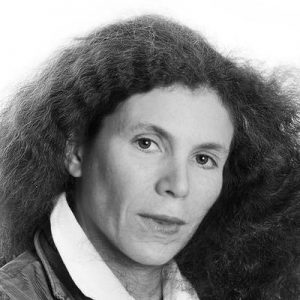
Yulia Latynina (Twitter)
After multiple life-threatening attacks, Yulia Latynina fled Russia. The columnist, contributor and writer works for independent newspaper Novaya Gazeta, as well as radio station Echo Moskvy.
“I have left Russia in connection with threats to my life,” Latynina wrote on Twitter on 10 September. A week before on 3 September, her car was set on fire and completely destroyed. On July 2017 the journalist’s car and parent’s house were sprayed with noxious gas which led to the poisoning of eight people in the surrounding area. In a third incident on August 2016, faeces were poured onto Latynina while she was on her way to work at Echo Moskvy station.
In all three cases, a proper investigation was not carried out and the perpetrators were not found.
Also in Russia, on 9 March 2016, an attack was made on a minibus carrying journalists and human rights activists, near the border between Ingushetia and Chechnya. After no suspects had been identified, the investigation was suspended in February 2017. Although Ingushetia resumed the investigation after a public backlash, no progress has been made.
SERBIA
Three controversial murder cases from the nineties and early 2000’s remain unresolved in Serbia, with the most well-known case being the murder of journalist and newspaper publisher Slavko Ćuruvija outside of his apartment in Belgrade in 1999. It is believed that the order came from senior secret service officials during the regime of strongman Slobodan Milošević. Four former state security officials have been on trial for the murder as of December 2014, which continues to progress slowly. The lack of closure to the case after nearly two decades shows the perpetuation of state impunity in Serbia even after regime change.
The suspicious death of journalist Dada Vujasinović in 1994 also remains unsolved. Vujasinović is believed to have been murdered because of her published articles regarding war criminal Željko Ražnatović, better known as Arkan. She was found dead in her apartment in 1994. The police ruled it a suicide and nobody has been arrested or prosecuted to this day.
The third case is that of Večernje Novosti journalist Milan Pantić, who was murdered in 2001. He reported on criminal affairs and official corruption. As of June 2017, the police investigation had finally been completed and suspects have been identified, awaiting a trial. All three of these cases are being investigated by an independent commission established in 2013.
UKRAINE

Pavel Sheremet (Photo: Ukrainska Pravda)
Journalist Pavel Sheremet‘s killing in a car bombing in Ukraine’s capital city on July 20, 2016, cast a chill over the country’s press corps, and the ongoing impunity for those behind the crime has continued to affect journalists’ ability to cover sensitive subjects.
Sheremet was killed when the car he was driving exploded in Kyiv. In a statement, Ukrainian police said that an explosive device detonated at 7.45am as Sheremet was driving to host a morning programme on Radio Vesti, where he had been working since 2015.
The car belonged to Sheremet’s partner, journalist Olena Prytula, who co-founded Ukrainska Pravda with murdered journalist Georgiy Gongadze.
Sheremet had been imprisoned by Belarusian authorities in 1997 for three months before being deported to Russia. Though stripped of his citizenship in 2010, he continued to report on Belarus on his personal website. He moved to the Ukrainian capital in 2011 to work for the newspaper Ukrainska Pravda.
There have been no arrests in the journalist’s murder.[/vc_column_text][/vc_column][/vc_row][vc_row][vc_column][vc_row_inner][vc_column_inner width=”1/2″][vc_single_image image=”80577″ img_size=”full” onclick=”custom_link” link=”https://www.balcanicaucaso.org/bloc-notes/Impunita-dei-crimini-contro-i-giornalisti-una-scelta-politica”][/vc_column_inner][vc_column_inner width=”1/2″][vc_column_text]
696 è il numero esatto di professionisti dell’informazione uccisi dal 2007 ad oggi nel mondo, secondo i dati raccolti dal Comitato per la Protezione dei Giornalisti (CPJ).[/vc_column_text][/vc_column_inner][/vc_row_inner][vc_row_inner][vc_column_inner width=”1/2″][vc_single_image image=”96211″ img_size=”full” onclick=”custom_link” link=”https://www.indexoncensorship.org/2017/10/targeting-journalists-name-national-security/”][/vc_column_inner][vc_column_inner width=”1/2″][vc_column_text]
As security – rather than the protection of fundamental rights and freedoms – becomes the number one priority of governments worldwide, broadly-written security laws have been twisted to silence journalists.[/vc_column_text][/vc_column_inner][/vc_row_inner][vc_row_inner][vc_column_inner width=”1/2″][vc_single_image image=”96229″ img_size=”full” onclick=”custom_link” link=”https://www.indexoncensorship.org/2017/10/turkish-injustice-scores-journalists-rights-defenders-go-trial/”][/vc_column_inner][vc_column_inner width=”1/2″][vc_column_text]
About 90 journalists, writers and human rights defenders will appear before courts in the coming days[/vc_column_text][/vc_column_inner][/vc_row_inner][vc_row_inner][vc_column_inner width=”1/2″][vc_single_image image=”96183″ img_size=”full” onclick=”custom_link” link=”https://www.indexoncensorship.org/2017/10/interpol-the-abuse-red-notices-is-bad-news-for-critical-journalists/”][/vc_column_inner][vc_column_inner width=”1/2″][vc_column_text]
Since August, at least six journalists have been targeted across Europe by international arrest warrants issued by Turkey, Azerbaijan, Uzbekistan and Kazakhstan[/vc_column_text][/vc_column_inner][/vc_row_inner][vc_custom_heading text=”Mapping Media Freedom” use_theme_fonts=”yes”][vc_separator color=”black”][vc_row_inner][vc_column_inner width=”1/4″][vc_icon icon_fontawesome=”fa fa-times-circle” color=”black” background_style=”rounded” size=”xl” align=”right”][/vc_column_inner][vc_column_inner width=”3/4″][vc_column_text]
Since 24 May 2014, Mapping Media Freedom’s team of correspondents and partners have recorded and verified over 3,600 violations against journalists and media outlets.
Index campaigns to protect journalists and media freedom. You can help us by submitting reports to Mapping Media Freedom.[/vc_column_text][/vc_column_inner][/vc_row_inner][/vc_column][/vc_row][vc_row][vc_column][vc_custom_heading text=”Don’t lose your voice. Stay informed.” use_theme_fonts=”yes”][vc_separator color=”black”][vc_row_inner][vc_column_inner width=”1/2″][vc_column_text]Index on Censorship is a nonprofit that campaigns for and defends free expression worldwide. We publish work by censored writers and artists, promote debate, and monitor threats to free speech. We believe that everyone should be free to express themselves without fear of harm or persecution – no matter what their views.
Join our mailing list (or follow us on Twitter or Facebook) and we’ll send you our weekly newsletter about our activities defending free speech. We won’t share your personal information with anyone outside Index.[/vc_column_text][/vc_column_inner][vc_column_inner width=”1/2″][gravityform id=”20″ title=”false” description=”false” ajax=”false”][/vc_column_inner][/vc_row_inner][vc_separator color=”black”][/vc_column][/vc_row]
20 Oct 2017 | Artistic Freedom, News and features
[vc_row][vc_column][vc_column_text]
With a paradoxically destructive optimism, satirists, from the age of the Roman poet Juvenal and since, have been driven by an almost childlike conviction that the world can and should do better. And the satirists of today, apostates as they are from the modern religion of political correctness – an orthodoxy that (despite professing to be both) is neither moral nor intellectual – need set their sights no further than their own milieu for the necessary targets.
A little over a year ago, at the close of the 2016 Edinburgh Fringe Festival, I presented the Defining the Norm Awards, an Oscars-styled lampooning of stand-up comedy banality and the predatory entertainment industry which fuels it. My intent was to unveil a satirical blueprint of how the mundane is cynically transferred from open mic to telly screen. And of all the sacred cows I have sought to slaughter in my twenty-year career as a satirist – from modern psychiatry to Islam – the current state of Western comedy was by far the most fanatically defended, if only by its practitioners.
What resulted was a tidal wave of social media whinging, suspicions cast upon my mental well-being, and a blacklisting that continues to this day from live bookers all the way up to the BBC comedy department. (“We can’t use Will Franken,” is the word from staff insiders on those rare occasions when my name is put forward for a project. “Remember, he’s the guy that did those awards.”) One thing, however, that was not in evidence in the wake of my mockery was anything resembling a satirical counter-response from the comedy collective. A point, I felt, had been painfully proven.
Because the disquieting truth in our present age is that those least qualified to understand, let alone appreciate, satire are too often comedians themselves. And to attack those who make false pretence to satire is to simultaneously attack a multitude of unquestioned shibboleths – be it lazy reliance on identity politics, Donald Trump’s presumed unfitness to be president, or even the sanctimonious mourning over Britain’s exit from the European Union.
Yet leaving aside, for example, the sheer repetitiveness and predictability of Nigel Farage and Donald Trump putdowns, what makes such political targets ultimately ineffective as contemporary satirical fodder is simply this: Farage and Trump are funnier than most comedians. Both figures, after all, managed to accomplish, in quick succession, major acts of geopolitical subversion against the status quo. Once in the not-too-distant past, this would have been the objective of comedy.
Though such an observation remains anathema to current entertainment establishment, such is the short-sightedness of effective satirists that rarely do they think ahead in terms of people-pleasing career advancement. Rather, he or she is compelled by an attribute especially repulsive to today’s current crop of entertainers: morality.
For amidst all the speculation amongst comedians as to why I decided to hold those in my field up to ridicule, the simple – and therefore baffling – truth was that I ridiculed them because I believed they needed to be ridiculed. [/vc_column_text][/vc_column][/vc_row][vc_row][vc_column][vc_custom_heading text=”Battle of Ideas 2017″ use_theme_fonts=”yes” link=”url:https%3A%2F%2Fwww.battleofideas.org.uk%2F|||”][vc_separator color=”black”][vc_column_text]A weekend of thought-provoking public debate taking place on 28 and 29 October at the Barbican Centre. Join the main debates or satellite events.[/vc_column_text][vc_row_inner][vc_column_inner width=”1/3″][vc_column_text]Political activism and protest today
Recent years have seen something of a revitalisation of political protests and marches, but just what is protest historically and today?
[/vc_column_text][/vc_column_inner][vc_column_inner width=”1/3″][vc_column_text]Can satire survive the era of fake news?
Will the ‘fake news’ era irreparably damage the satirist’s ability to effect any kind of societal change?[/vc_column_text][/vc_column_inner][vc_column_inner width=”1/3″][vc_column_text]Censorship and identity: Free speech for you but not for me?
Is identity politics the new tool of censorship and, if so, how should we respond?[/vc_column_text][/vc_column_inner][/vc_row_inner][/vc_column][/vc_row]







 A month earlier, in a serious blow to media freedom, Facebook
A month earlier, in a serious blow to media freedom, Facebook 




